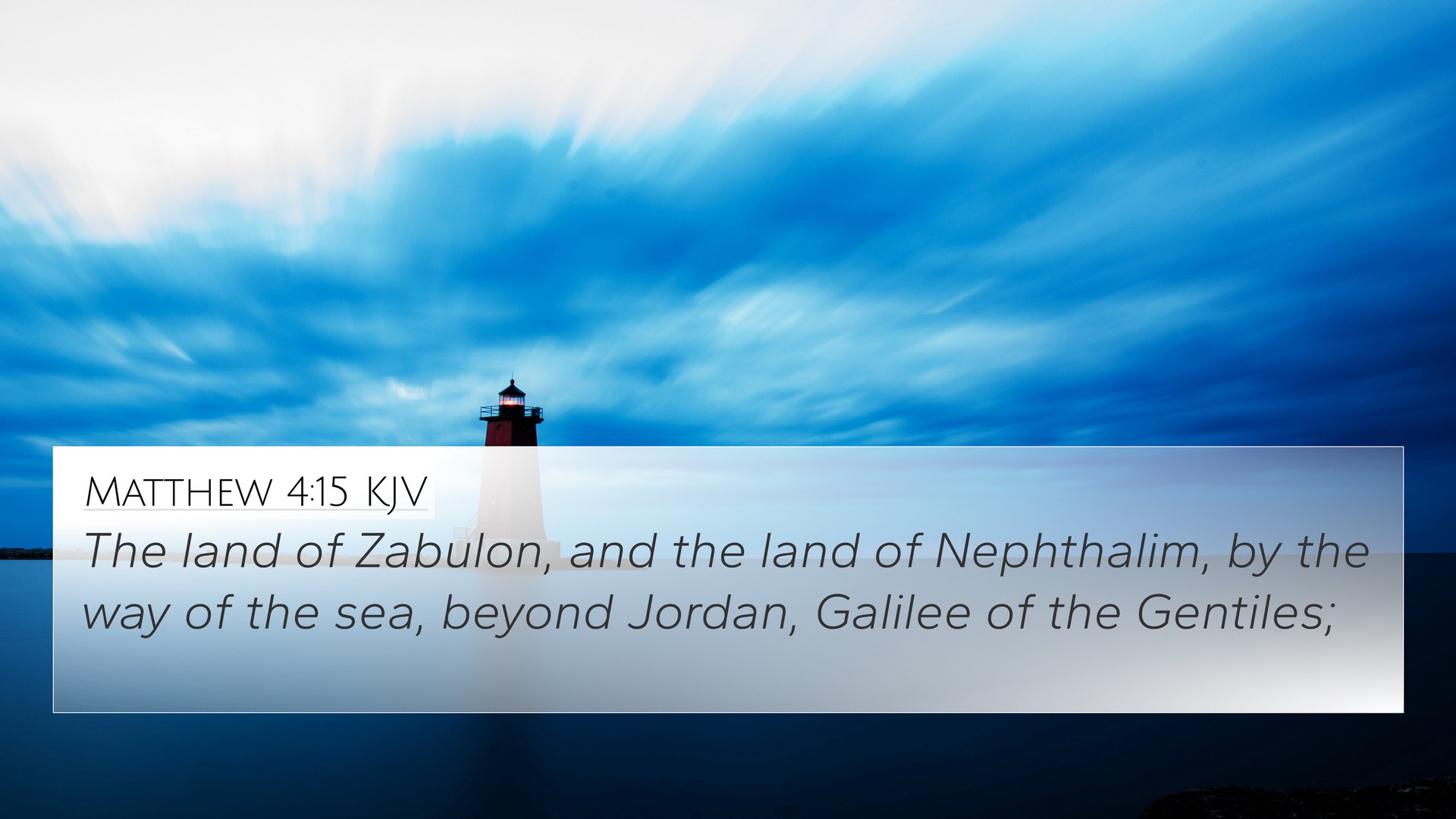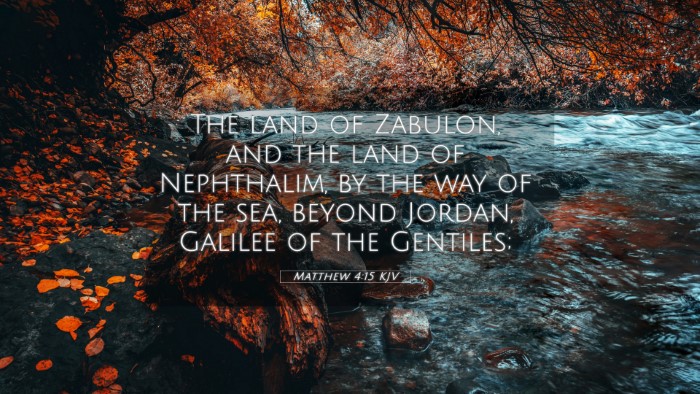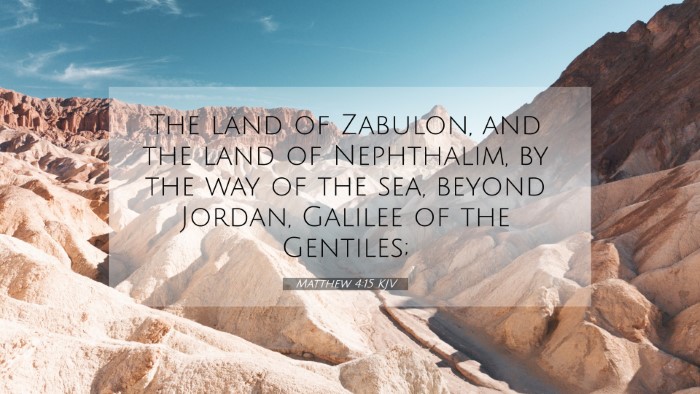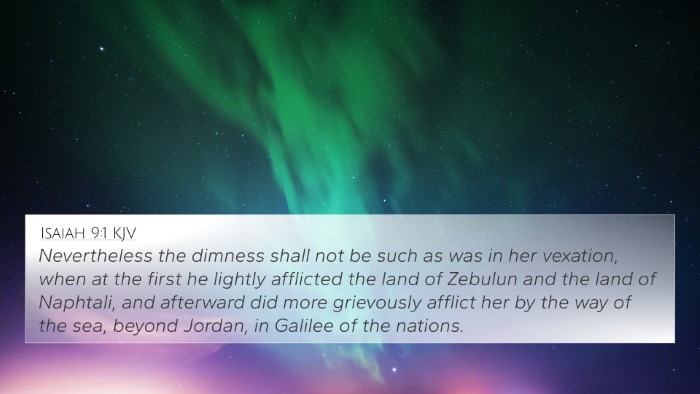Understanding Matthew 4:15
Matthew 4:15 states:
"The land of Zebulun and the land of Naphtali, by the way of the sea, beyond the Jordan, Galilee of the Gentiles."
Summary of the Verse's Meaning
This verse serves as a pivotal introduction to Jesus' ministry in Galilee and is a fulfillment of Old Testament prophecy. Here are the key insights gained from public domain commentaries:
- Geographical Significance: The mention of Zebulun and Naphtali highlights the historical and geographical context of Jesus' early ministry. These regions were located in northern Israel and were significant for their mixed population of Jews and Gentiles, setting the stage for a ministry that would break ethnic barriers. This aligns with the theme of the Gospel addressing all nations.
- Prophetic Fulfillment: Matthew references the prophecy from Isaiah 9:1-2, which speaks to the coming light to those in darkness. This connection emphasizes that Jesus' arrival was not an accident but was divinely orchestrated to fulfill scripture.
- Thematic Connection to Light: The phrase "Galilee of the Gentiles" alludes to the light that Christ brings, which is a recurring theme in the Gospels. This portrays Jesus as a source of hope for those lost in darkness, fulfilling personal and communal expectations for deliverance.
- Spiritual Implications: The mention of "the way of the sea" indicates a significant trade route, suggesting that the message of Christ would reach far and wide, transcending local boundaries and cultural limitations.
Scriptural Cross-References
Matthew 4:15 connects with various other Bible verses that enrich its interpretation:
- Isaiah 9:1-2: The prophecy which Matthew is quoting directly speaks about the areas mentioned in Matthew and highlights the arrival of light in darkness.
- Isaiah 8:23: This passage also pertains to the context of Israel's current predicament and the forthcoming hope through a promised Savior.
- Matthew 2:16-18: Discusses Herod's massacre and the fulfillment of prophecy regarding the Messiah’s protection and lineage.
- Luke 1:78-79: The prophecy of Zechariah touches upon the 'rising sun' that will shine on those living in darkness, further linking to Jesus as the light.
- John 1:4-5: Describes Jesus as the light that shines in darkness and profoundly echoes the theme identified in Matthew 4:15.
- Matthew 12:15-21: The prophetic significance of Jesus serving as a servant to the Gentiles is elaborated upon, connecting His mission to that of the broader world.
- Isaiah 42:6: God's promise to provide a light for the Gentiles, directly correlating with Jesus' ministry in Galilee.
Comparative Analysis with Other Gospel Accounts
The connections between Matthew’s account and the other Gospels illustrate the multifaceted nature of Jesus' mission. Each Gospel presents unique perspectives, but they collectively reinforce the unity of Christ's purpose:
- Mark 1:14-15: Highlights the commencement of Jesus' ministry with an emphasis on the good news, indicated by the call to repentance.
- Luke 4:14-15: Indicates that Jesus returned to Galilee empowered by the Spirit, further strengthening the significance of this region in His ministry.
Tools for Further Study
For those seeking deeper understanding, various resources can help in cross-referencing and thematic studies:
- Bible Concordance: A tool that can assist in locating similar verses and themes across the scriptures.
- Bible Cross-Reference Guide: A helpful resource to explore connections between verses and deepen understanding.
- Comprehensive Bible Cross-Reference Materials: These allow for broader biblical studies, identifying intricate relationships between illustrations throughout scripture.
Final Thoughts
Understanding Matthew 4:15 through the lens of these commentaries underscores the prophetic nature of Jesus’ ministry, prioritizing the importance of both context and fulfilment of the Old Testament. By exploring these connections, believers can gain a rich, layered understanding of scripture, enhancing their spiritual journey and comprehension of Christ's transformative mission.







